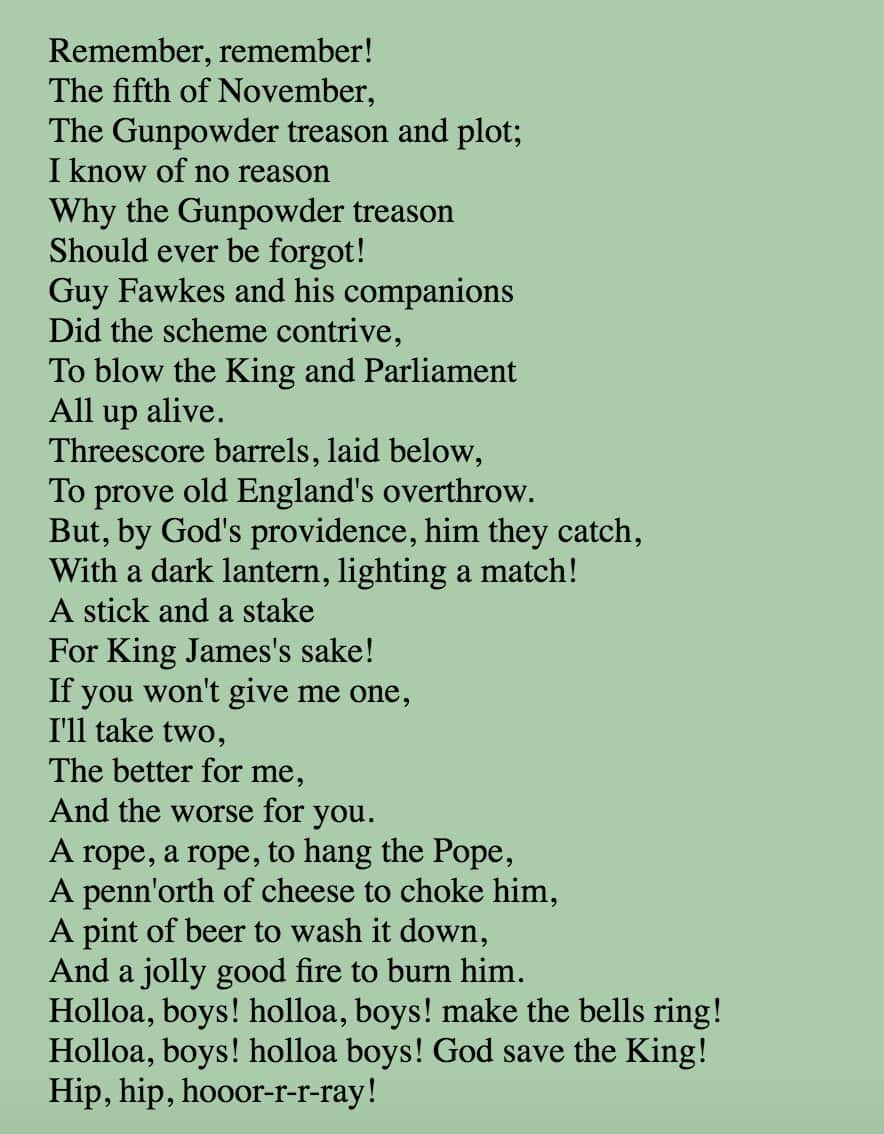The Enchanting History of the “Remember the Fifth of November” Poem
Hello fantastic parents!
Are you ready to dive into the rich tapestry of history with your little ones? The “Remember the Fifth of November” poem is not just a catchy rhyme; it’s a gateway to exploring England’s past, traditions, and the meaning behind the famous Guy Fawkes Night. In this comprehensive guide, we’ll uncover the secrets behind the poem and how you can turn this historical piece into an exciting, educational experience for your children.
Gateway to the Past: Understanding the Poem’s History
Once upon a time, on a chilly November night, a tale unfolded that would be remembered for centuries. “Remember, remember, the fifth of November”, begins a poem that dates back to 17th-century England, recounting the story of the Gunpowder Plot of 1605. A group of conspirators, including the infamous Guy Fawkes, attempted to blow up the Houses of Parliament and assassinate King James I. Their goal? To restore a Catholic monarch to the throne in Protestant England. Each stanza of this poem unlocks part of this historical event, and we’re here to explore each one with you!
Fun Facts for Curious Minds
Before you start reciting the poem with your kids, let’s sprinkle some fun facts that will make the learning even more delightful:
- Did you know that Guy Fawkes wasn’t the mastermind behind the Gunpowder Plot? The plot’s leader was actually Robert Catesby.
- People started singing the poem as a way to remember the failed plot and celebrate the survival of the king. Now, it’s synonymous with Bonfire Night festivities in the UK.
- The full version of the poem has many more verses than the commonly recited couplet, delving deeper into the story behind this historic event.
Creative Ways to Teach Your Kids the Poem
Transform this history lesson into an unforgettable adventure with these engaging activities:
- Interactive Storytelling: Set the stage with props and costumes to bring the story to life. Your kids can take on the roles of the key players in the Gunpowder Plot or even become secret detectives investigating the event.
- Arts and Crafts: Help your children make their own Guy Fawkes masks and lanterns while explaining the importance of the symbols related to the fifth of November.
- Rhyme Time: Encourage your youngsters to pen their own verses to follow the classic lines. This is a fun way to work on rhyming skills and learn about rhythm and meter.
Learning about Guy Fawkes and the significance of Bonfire Night is not only an educational journey but also a fabulous opportunity to ignite your children’s imagination. The poem serves as a portal to understanding the historical context of the Gunpowder Plot, its sociopolitical implications, and the laws that changed as a result.
The poem’s rhythm and cadence make it a memorable piece that stays with children long after the sparklers have fizzled on Bonfire Night. It represents a fusion of literature, history, and tradition that can inspire a love for learning in your little ones. So, let’s not only “remember the fifth of November” but also embrace the chance to foster a deeper connection with our past through the captivating verses of this poem.
Stay tuned as we continue to delve into each verse of the poem, unravel its meanings, and discover more thrilling ways to engage with history through this centuries-old rhyme…

5 Essential Tips for Parents Prepping for the “Remember the Fifth of November” Poem
As Bonfire Night approaches, you might be thinking about how to involve your kids in the “Remember the Fifth of November” celebrations. Here are five essential tips for parents to make the most out of this historical commemoration:
- Brush Up on History: Take some time to learn about the Gunpowder Plot yourself. Understanding the context will allow you to answer your child’s questions and engage in meaningful discussions about the event.
- Safety First: If you’re planning to attend a bonfire or firework display, teach your kids about fire safety. Educate them on the importance of staying at a safe distance from fireworks and bonfires.
- Plan Engaging Activities: Along with traditional activities like attending a bonfire, think of creative ways to engage with the history at home. Bake “plot” cookies, have a poetry night, or create themed art projects.
- Connect with the Community: Many communities host Guy Fawkes events. Participating can be a great way for kids to see the collective spirit of remembrance and to understand the poem’s role in British culture.
- Discuss the Moral Lessons: While celebrating the thwarted plot, it’s also important to discuss the serious themes it encompasses, such as political persecution, religious intolerance, and the ethics behind the conspirators’ actions.
Now that you’re equipped with knowledge, fun facts, teaching tips, and practical advice, you’re all set to help your kids explore and understand the “Remember the Fifth of November” poem. This Bonfire Night, be ready to light up their world with a fusion of learning and fun, ensuring they remember this historic event in a way that’s meaningful, educational, and most importantly, safe. Enjoy the fireworks of learning and the sparkles of curiosity with your children this November!
With your enthusiastic participation and guidance, the stories of Guy Fawkes and his fellow plotters will not only be a lesson from the past but also a present moment of shared discovery and enjoyment. So gather your props, ignite the bonfire of imagination, and ready your young history buffs for a captivating journey back to the 17th century. Embrace the spirit of the season, and create cherished memories that will linger on, much like the recollections of the fifth of November itself.
See more great Things to Do with Kids in New Zealand here. For more information see here
Disclaimer
The articles available via our website provide general information only and we strongly urge readers to exercise caution and conduct their own thorough research and fact-checking. The information presented should not be taken as absolute truth, and, to the maximum extent permitted by law, we will not be held liable for any inaccuracies or errors in the content. It is essential for individuals to independently verify and validate the information before making any decisions or taking any actions based on the articles.




